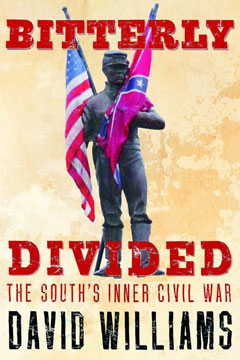New York : New Press, 2010, c2008.
Pbk. ed.
310 p. : ill. ; 21 cm.
This is one of those great history books that causes you to rethink the things you thought you knew about a major event. In this case, the author is reexamining the Civil War - particularly the prevailing view of the Confederacy as society committed in wartime to the success of an overwhelmingly popular cause - the the desire to preserve secession and the white southern way of life.
Williams instead details how the secession movement was an anti-democratic takeover of southern legislatures by powerful elites - especially the large slaveholders. He presents a wealth of documentation showing that secession never had a popular mandate - until armed conflict actually broke out. Williams also points out that the Confederacy had to rely on severe conscription laws to fill the ranks of the army and how the exemption of large slaveholders created mass discontent. Finally Williams documents how the large landholders of the Confederacy contributed to the defeat of the South by dedicating much of their land to luxury items on which they could make exorbitant profits (due to the blockade) instead of foodstuffs that would have helped feed the soldiers and their families who struggled to feed themselves due to shortages and the lack of manpower.
The book is a powerful indictment of war profiteering and the exploitation of the lower classes by the rich southern aristocracy during the Civil War - themes that still have resonance in the current US landscape of war and wealth inequities.


No comments:
Post a Comment